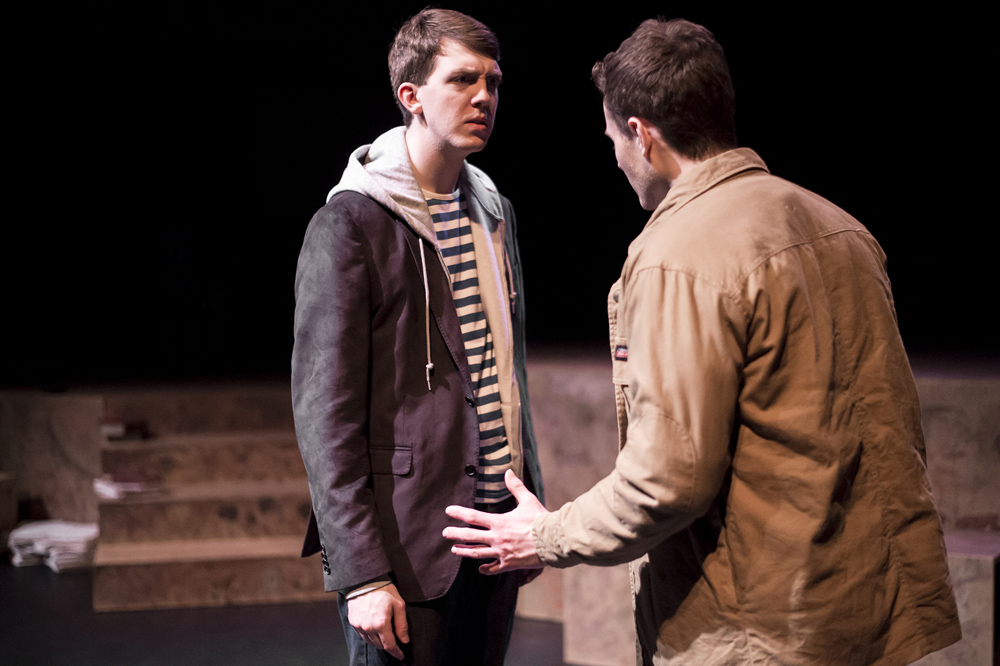In 2003, writer and journalist David Holthouse plotted to kill a man — the Bogeyman. He’d bought a throwaway pistol and silencer, and he’d go up to the man who raped him when Holthouse was 7 and put three bullets into his head.
Instead, Holthouse wrote an essay.
“Stalking the Bogeyman” shows one time only at 7:30 p.m. Friday at the Mariner Theatre, part of the University of Alaska Anchorage Theatre and Dance Department’s tour. The play premiered in Asheville, N.C., in 2013, and played Off Broadway in 2014.
Then living in Denver, in 2004, Holthouse wrote “Stalking the Bogeyman,” an essay published in Westword. Stark, honest and bold, Holthouse tells about how the Bogeyman, then a teenager and the son of friends of Holthouse’s parents, sexually assaulted Holthouse in the basement while the friends entertained his parents upstairs at their Anchorage home. Twenty-five years later, Holthouse discovered the Bogeyman lived in the Denver area.
So he’d kill him.
That plan fell apart when Holthouse’s parents found a childhood diary entry he’d written about the rape. His parents called him and then they sent an anonymous letter to their friends saying their son was a rapist. That lead to a different confrontation between Holthouse and the rapist, an ending that might not be satisfying to some.
“It’s not a good feeling that you get from watching this story. There’s a lot that’s unresolved and it brings up a lot of questions,” said Carolyn Norton, Kenai Peninsula Children’s Advocacy Center coordinator. “It doesn’t get neatly tied up in a bow.”
South Peninsula Haven House’s Child Advocacy Center is collaborating with Pier One Theatre in bringing the play to Homer.
“Stalking the Bogeyman,” the play, came about after National Public Radio’s “This American Life” ran a version of the story, and playwright and director Markus Potter heard it and contacted Holthouse. Potter gave Holthouse veto power on the script, with the provision that Holthouse would be able to read and sign off on every version of the script.
“It’s just excellent. In many ways it’s the best production yet,” Holthouse said in a phone interview of the UAA version. “The lead, Devin (who plays Holthouse in the play) — he’s just an incredibly talented actor. He plays it with just the right amount of righteous, vengeful anger, but also wonderfully vulnerable. I’ve been very impressed.”
Seeing “Stalking the Bogeyman” in the state where he grew up has been upsetting but also healing, Holthouse said.
“It’s like ripping a scab off every night,” he said. “In some ways, it’s healing, because it’s finally bringing it back home, to my home turf. It’s reclaiming Alaska for myself.”
With subject matter like rape and revenge, “Stalking the Bogeyman” comes with a warning that the play isn’t appropriate for all audiences and might cause emotional distress to people who have experienced sexual assault. UAA has provided counselors at productions in Alaska, Norton said.
Portions of the proceeds will benefit the Child Advocacy Center, and there will be counselors on hand in Homer as well.
There also have been “talk backs,” post-play discussions between audience members and the cast and crew. Norton said that will happen at the Homer production. The playbill also will include information about the Child Advocacy Center.
As “Stalking the Bogeyman” ran in Anchorage, Holthouse said not a day went by when someone told him stories of experiences with sexual assault.
“Which goes to show how prevalent this evil is in our culture,” he said. “It’s just largely unspoken about. This play gives people the ability to tell their own stories.”
Norton said that kind of silence is common among child abuse survivors. “A fraction of children who are sexually abused tell somebody right away or even at all,” she said.
Holthouse said people have told him he was brave for writing his essay. When he wrote it, he said he thought, “What are you talking about? I’m a writer. That’s what I do.” The essay came about during what he calls his “gonzo period.”
“It was like hell on wheels. I was out of control. I seldom thought through the ramifications. I don’t know if I would write that piece today,” Holthouse said.
As dark as the play is, Holthouse said there are some funny moments, like when David meets some drug dealers.
“We designed the play for it to be very entertaining. It’s a thriller,” he said. “It’s very fast paced. It’s kind of a buckle-up experience. … It’s not light entertainment, but it’s a hell of a ride.”
Michael Armstrong can be reached at michael.armstrong@homernews.com.
Stalking the Bogeyman
7:30 p.m. Friday — one night only
Mariner Theatre
$12, on sale at the Homer Bookstore or the door; a portion of the proceeds benefits the South Peninsula Haven House Child Advocacy Center
A University of Alaska Anchorage Department of Theatre production, in association with Pier One Theatre
Adapted by Markus Potter and David Holthouse
With additional writing by Shane Ziegler, Shane Stokes and Santino Fontana
Contains graphic content and may not be suitable for all ages. Some material may be disturbing to people who have experienced child sexual abuse.
A discussion of the play with the cast and director follows the play. Counselors will be available for people who may suffer emotional distress from seeing the play.
For more information on the play visit www.stalkingthebogeyman.com.
For more information on the South Peninsula Haven House Child Advocacy Center, call Carolyn Norton, Kenai Peninsula Children’s Advocacy Center Coordinator, 235-7720 or email Carolyn@havenhousealaska.org.


